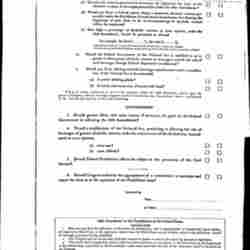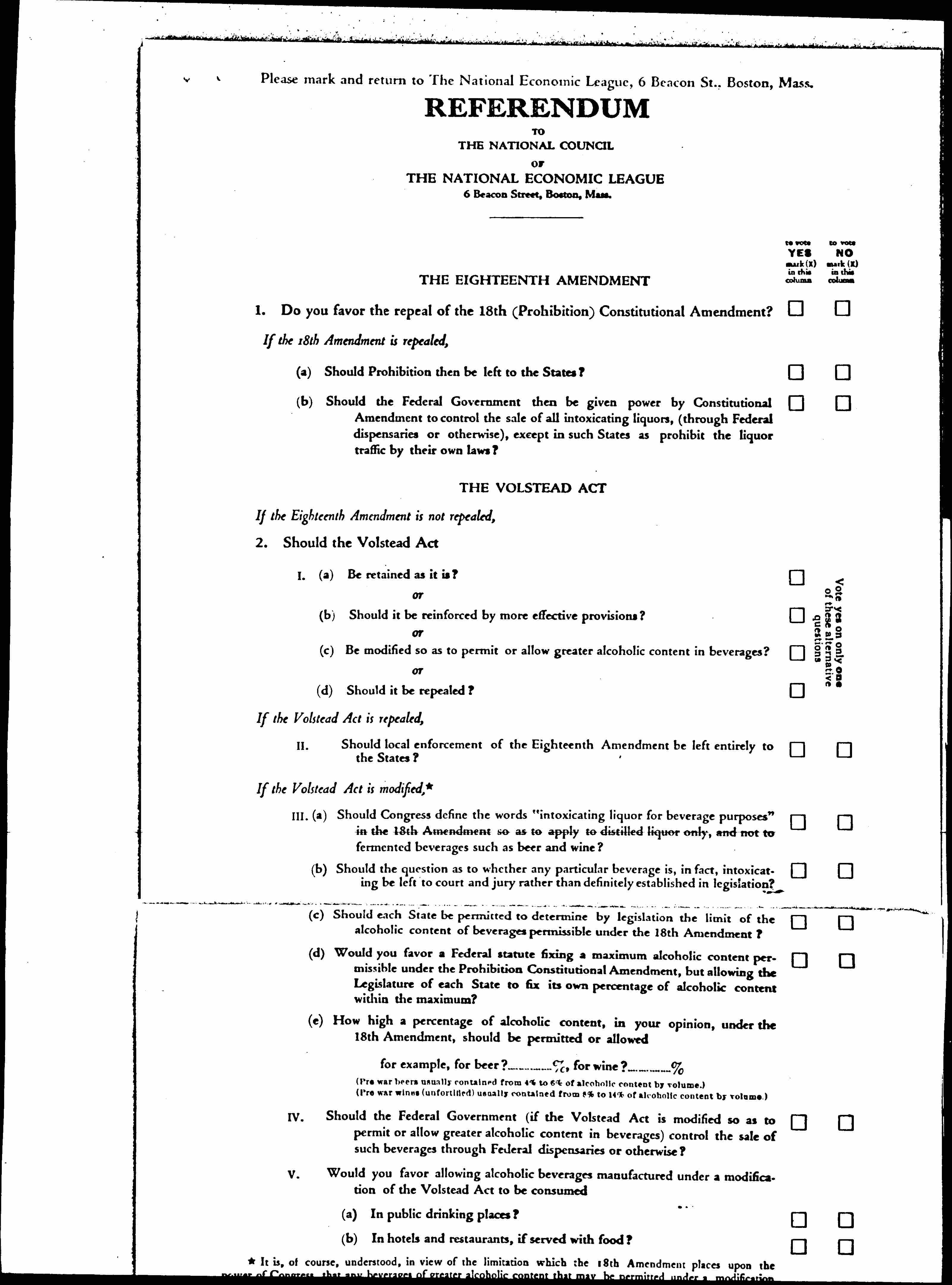Please mark and return to The National Economic League, 6 Beacon St., Boston, Mass.
| THE EIGHTEENTH AMENDMENT | to vote YES mark (X) in this column | to vote NO mark (X) in this column |
| 1. Do you favor the repeal of the 18th (Prohibition) Constitutional Amendment? | ||
| If the 18th Amendment is repealed, | ||
| (a) Should Prohibition then be left to the States? | ||
| b) Should the Federal Government then be given power by Constitutional Amendment to control the sale of all intoxicating liquors, (through Federal dispensaries or otherwise), except in such States as prohibit the liquor traffic by their own laws? | ||
| THE VOLSTEAD ACT | ||
| If the Eighteenth Amendment is not repealed, | ||
| 2. Should the Volstead Act | ||
| I. (a) Be retained as it is? or (b) Should it be reinforced by more effective provisions? or (c) Be modified so as to permit or allow greater alcoholic content in beverages? or (d) Should it be repealed? |
Vote yes on only one of these alternative questions | |
| If the Volstead Act is repealed, | ||
| II. Should local enforcement of the Eighteenth Amendment be left entirely to the States? | ||
| If the Volstead act is modified,* | ||
| III. (a) Should Congress define the words "intoxicating liquor for beverage purposes" in the 18th Amendment so as to apply to distilled liquor only, and not to fermented beverages such as beer and wine? | ||
| (b) Should the question as to whether any particular beverage is, in fact, intoxicating be left to court and jury rather than by definitely established in legislation? [page 2] | ||
| (c) Should each State be permitted to determine by legislation the limit of the alcoholic content of beverages permissible under the 18th Amendment? | ||
| (d) Would you favor a Federal Statute fixing a maximum alcoholic content permissible under the Prohibition Constitutional Amendment, but allowing the Legislature of each State to fix its own percentage of alcoholic content within the maximum? | ||
|
(e) How high a percentage of alcoholic content, in your opinion, under the 18th Amendment, should be permitted or allowed? for example, for beer? [blank] %, for wine? [blank]% (Pre war beers usually contained from 4% to 6% of alcoholic content by volume.) (Pre war wine {unfortified} usually contained from 8% to 14% of alcoholic content by volume.) |
||
| IV. Should the Federal Government (if the Volstead Act is modified so as to permit or allow greater alcoholic content in beverages) control the sale of such beverages through Federal dispensaries or otherwise? | ||
| V. Would you favor allowing alcoholic beverages manufactured under a modification of the Volstead Act to be consumed | ||
| (a) In public drinking places? | ||
| (b) In hotels and restaurants, if served with food? | ||
| *It is, of course, understood, in view of the limitation which the 18th Amendment places upon the power of Congress, that any beverages of greater alcoholic content that may be permitted under a modification of the Volstead Act must be, in fact, [nonintoxicating]. | ||
| ENFORCEMENT | ||
| 3. Should greater effort, and more money if necessary, be spent by the Federal Government in enforcing the 18th Amendment? | ||
| 4. Would a modification of the Volstead Act, permitting or allowing the sale of beverages of greater alcoholic content, make the enforcement of the Prohibition Amendment in your opinion, | ||
| (a) more easy? | ||
| (b) more difficult? | ||
| 5. Should Federal Prohibition officers be subject to the provisions of the Civil Service? | ||
| 6. Should Congress authorize the appointment of a commission to ascertain and report the facts as to the operation of the Prohibition laws? |
Submitted by
Name [blank]
of (State) [blank]
§
18th Amendment to the Constitution of the United States.
ARTICLE XVIII.
1. After one year from the ratification of this article the manufacture, sale or transportation of intoxicating liquors within, the importation thereof into, or the exportation thereof from the United States and all territory subject to the jurisdiction thereof for beverage purposes is hereby prohibited.
2. The Congress and the several states shall have concurrent power to enforce this article by appropriate legislation.
3. This article shall be inoperative unless it shall have been ratified as an amendment to the Constitution by the Legislatures of the several states, as provided by the Constitution, within seven years from the date of the submission hereof to the states by Congress.










Comments